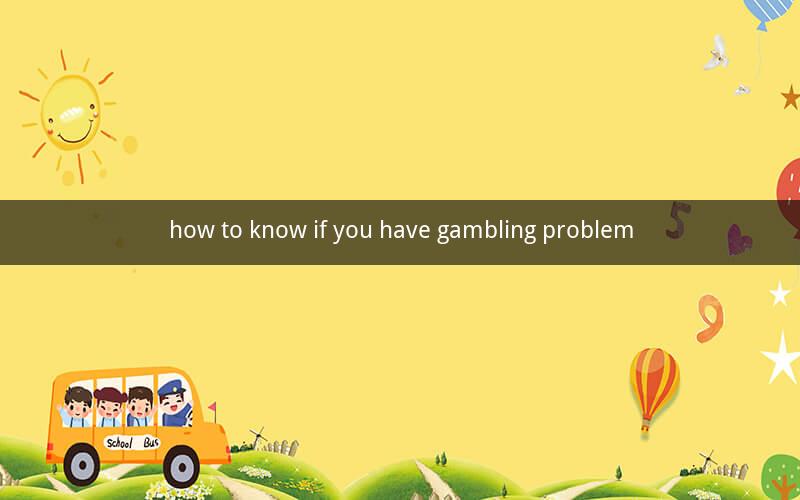
How to Know If You Have a Gambling Problem: A Comprehensive Guide
Table of Contents
1. Understanding Gambling
2. Identifying the Signs of a Problem
- 1.1 Financial Consequences
- 1.2 Emotional and Psychological Symptoms
- 1.3 Social and Personal Relationships
3. The Impact of Problem Gambling
4. Seeking Help and Support
- 4.1 Professional Help
- 4.2 Support Groups
- 4.3 Self-Help Strategies
5. Preventing Problem Gambling
6. Resources for Further Information
1. Understanding Gambling
Gambling is the act of wagering money or something of value on an event with an uncertain outcome. It can be a form of entertainment or a serious addiction. Before determining if you have a gambling problem, it's important to understand what gambling is and how it can affect you.
2. Identifying the Signs of a Problem
2.1 Financial Consequences
- Persistent Debts: You may find yourself incurring debts that you cannot repay.
- Gambling to Pay Off Debts: You might use gambling as a means to pay off existing debts, leading to a cycle of borrowing and gambling.
- Financial Secrecy: You may hide your gambling activities from friends and family to avoid judgment or consequences.
2.2 Emotional and Psychological Symptoms
- Increased Risk-Taking: You might take increasingly risky bets to try to win back money or to feel the thrill of gambling.
- Denial: You may deny or rationalize your gambling behavior, even when it's clear you have a problem.
- Mood Swings: You might experience intense emotions, such as elation or depression, depending on the outcome of your gambling.
2.3 Social and Personal Relationships
- Neglecting Responsibilities: You may neglect your work, family, or other responsibilities due to gambling.
- Loss of Interest: You may lose interest in hobbies or activities that were once enjoyable.
- Arguments: You might have frequent arguments with family or friends over your gambling habits.
3. The Impact of Problem Gambling
Problem gambling can have severe consequences, including:
- Financial Ruin: You may lose all your money and assets.
- Legal Issues: You could face legal problems due to illegal gambling activities.
- Physical Health: Problem gambling can lead to stress, anxiety, and other health issues.
- Mental Health: It can contribute to depression, anxiety, and substance abuse.
4. Seeking Help and Support
4.1 Professional Help
- Therapy: A therapist can help you understand your gambling behavior and develop strategies to cope with it.
- Counseling: Professional counselors can provide guidance and support for individuals struggling with gambling addiction.
4.2 Support Groups
- Gamblers Anonymous: This is a fellowship of individuals who share their experience, strength, and hope with each other.
- Online Support Groups: There are online communities where you can find support and advice from others who have faced similar challenges.
4.3 Self-Help Strategies
- Setting Limits: Decide on a budget for gambling and stick to it.
- Time Management: Limit the amount of time you spend gambling.
- Avoid Triggers: Stay away from places that trigger your gambling urge.
5. Preventing Problem Gambling
- Educate Yourself: Learn about the risks of gambling and how to recognize the signs of a problem.
- Stay Informed: Keep up-to-date with responsible gambling resources and information.
- Be Mindful: Pay attention to your gambling habits and be honest with yourself about your behavior.
6. Resources for Further Information
- National Council on Problem Gambling: A resource for finding help and information on problem gambling.
- Gamblers Anonymous: Offers support groups and resources for individuals affected by gambling addiction.
- The National Center for Responsible Gaming: Provides research and information on problem gambling.
---
Questions and Answers
1. Q: What are the first steps to take if you suspect you have a gambling problem?
A: Acknowledge your concerns and seek help from a professional or support group.
2. Q: Can problem gambling be cured?
A: Problem gambling is a treatable condition, but it requires commitment and ongoing support.
3. Q: How can I prevent my children from developing a gambling problem?
A: Educate them about the risks of gambling and monitor their activities online and in person.
4. Q: Is it possible to gamble responsibly?
A: Yes, but it requires self-discipline and awareness of personal limits.
5. Q: Can therapy help with problem gambling?
A: Yes, therapy can provide strategies and support to help you manage your gambling behavior.
6. Q: What are some warning signs of problem gambling in a loved one?
A: Watch for changes in financial stability, mood swings, and social withdrawal.
7. Q: Can problem gambling lead to other addictions?
A: Yes, problem gambling can be a gateway to other forms of addiction, such as substance abuse.
8. Q: Are there any medications that can help with problem gambling?
A: Some medications may be prescribed to help manage the symptoms of gambling addiction.
9. Q: How can I support a friend who has a gambling problem?
A: Offer your support without judgment and encourage them to seek professional help.
10. Q: Is online gambling safer than traditional gambling?
A: Online gambling can be just as risky as traditional gambling and often has additional risks related to security and privacy.